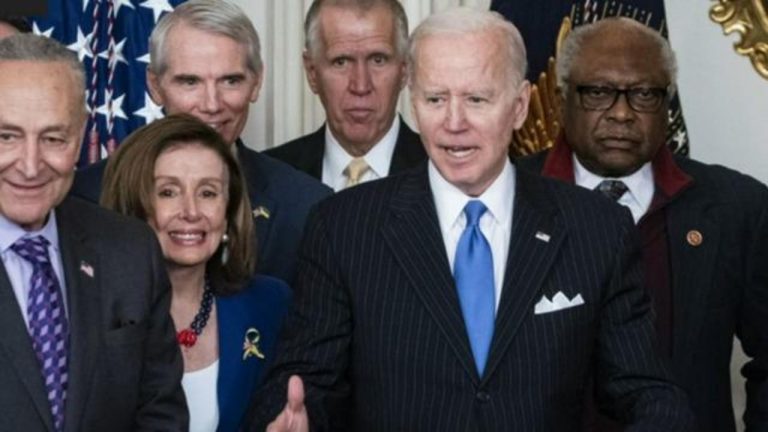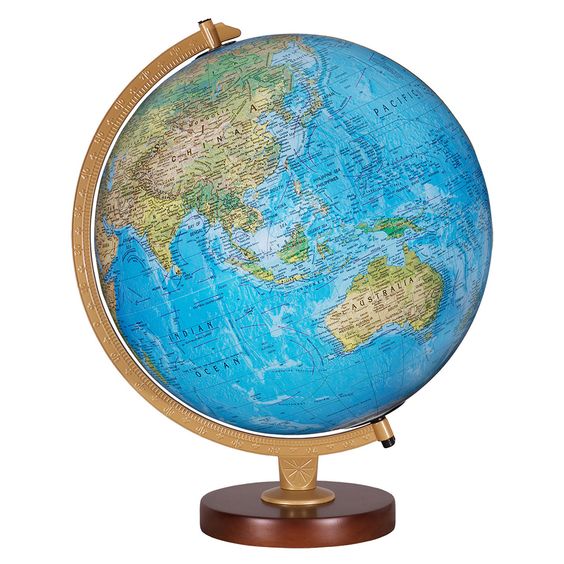
The visit to Taiwan by Nancy Pelosi, the Speaker of the House of Representatives, has exposed a confused, disjointed and divided policy towards the crucial issue of Taiwan which has repercussions on a wide range of world issues.
By Tom Arms
President Joe Biden is a foreign policy disappointment. He entered the White House with more foreign affairs experience than almost any of his predecessors—23 years on the Senate Foreign Relations Committee during which time he met 150 heads of government.
The world had hoped—no, expected—that the new president would inject an ordered wisdom into America’s conduct of world affairs after the chaos of the Trump years. Instead, it has been presented with an increasingly disjointed and incoherent foreign policy which has fallen dangerously short of expectations.
The latest example is the visit to Taiwan by Nancy Pelosi. The Speaker of the House of Representatives – who is second in line to the presidency– said her trip was meant to show strength of purpose. Instead it has exposed a confused, disjointed and divided policy towards the crucial issue of Taiwan which has repercussions on a wide range of world issues.
It was obvious that the visit would infuriate Beijing. And it did. They have responded with a series of dangerous military exercises in the Taiwan Straits, ballistic missile firings, cyber-attacks, Chinese fighter jet sorties into Taiwanese airspace and a ban on Taiwanese food imports. There is a fear that the Chinese reaction may drag on in the form of a de facto blockade of the island which Beijing claims as China’s 23rd province.
The Taiwan issue does not exist in its own bubble. China is a key player, if relatively quiet one, in the Ukraine War. Western victory in Ukraine is key to undermining autocracy in Moscow, Beijing and everywhere else that is opposed to the democratic system. Nancy Pelosi quite rightly told the Taiwanese parliament that “the world faces a choice between democracy and autocracy.”
But she is wrong in thinking that today’s frontline is in the Taiwan Straits. It is in Ukraine, and Washington needs Beijing to maintain its relatively neutral position to defeat Russian autocracy and delivery a body blow to autocratic governments everywhere else. So far President Xi Jinping has provided his friend Vladimir Putin with political support and some economic help, but he has stopped short of full-throated backing and has—for now—withheld military aid. A change in America’s Taiwan policy could result in change in China’s Ukraine policy.
Part of the problem with the administration of American foreign policy is that there too many competing branches of government with their fingers in the global pie. The CIA, State Department, Pentagon, Homeland Security, FBI, National Security Council, The Treasury, Department of Commerce and National Security Agency all have a say and a different viewpoint. Then there is the Senate Foreign Relations committee, 50 Governors with presidential aspirations, and 535 members of the Senate and House of Representatives with similar ambitions.
The problems of America’s foreign policy would be easier if there was bipartisan agreement. There isn’t. Former Secretary of State Mike Pompeo (now 90 pounds lighter) is a likely candidate for the Republican presidential nomination. He wants to drop America’s one China policy with its accompanying “strategic ambiguity” and replace it with official recognition of Taiwan as an independent state. Beijing has warned that this would be tantamount to a declaration of war.
China does not want a war with the US; at least not now. It is not ready for it. The Chinese are practical people and wars are costly and involve politically dangerous leaps into the unknown. Beijing prefers certainties. The US does not want a war either, especially while it is heavily committed to Europe because of Russian aggression in Ukraine.
The danger is that either Washington or Beijing will feel it is backed into a corner where military action is the only option. Pelosi’s visit comes two months before the Chinese Communist Party Congress at which Xi is expected to be confirmed in a third term. The recovery of Taiwan is the number one article faith for the CCP and is heavily backed by the Chinese public. The leader who is seen as weak on the issue is unlikely to remain at the top of the political heap. Conversely, Taiwan is seen more and more in America as a frontline state in the war between autocracy and democracy.
Ironically, the Taiwanese are not in total agreement with their American backers. They want US weapons and political and military support to deter an attack from mainland China. But, at the same time, Taipei is constantly seeking dialogue and compromise with Beijing. The last thing they want is a Sino-American conflict which would reduce their prosperous island to a pile of rubble.
 World Review
World Review
- Forget about Chernobyl. That was small fry worry. Focus instead on the largest nuclear power plant in Europe. Zaporizhzhia supplies half of Ukraine’s nuclear-generated electricity; is next door to the city of Enerhodar (pre-war population of 53,000) and sits alongside the Dnieper River which supplies the drinking water for millions in southeastern Ukraine and Crimea. The nuclear facility was captured by Russia on 4 March during the Battle of Enerhodar. The power plant is being kept in operation with Ukrainian workers retained by the occupying Russians. But Putin’s forces have—according to US and Ukrainian sources—started using plant precincts as a base for artillery barrages. The Ukrainians are firing back. On top of that, no one from the UN oversight organization the International Atomic Energy Agency (IAEA) is making the regular visits that insure that all safety measures and checks are being followed. IAEA director Rafael Grossi this week told Associated Press “You have a catalogue of things happening that should never happen in a nuclear power plant.” Mr. Grossi is trying to negotiate access to Zaporizhzhia but to do that will require his inspectors passing through both Ukrainian and Russian lines. This is extremely dangerous for the inspectors and inordinately difficult to arrange.
- The British election campaign for the leadership of the Conservative Party and the Premiership of the country this week slipped into high farce and sailed into choppy constitutional waters. Starting with the farce, favorite Liz Truss announced that she would cut public sector pay by about $10 billion by reducing the wages of out of London public sector workers. The Institute for Government quickly pointed out that the proposed cut was more than an entire year’s salary for the entire British civil service. Ms. Truss was forced to do a rapid U-turn and, as she wiped the egg off her face, claimed that she had been “misinterpreted” by the media. The usual euphemism employed by politicians who have made a major gaffe and cannot admit it. Meanwhile, her opponent Rishi Sunak, announced that if he was elected Prime Minister, “people who vilify Britain will be treated as extremists”. Exactly what the penalties would be for being a vilifying extremist was left unsaid. Also unsaid was what exactly constitutes vilification of Britain, exposing a legal minefield to delight lawyers for years to come. Of course, the likelihood is that whichever candidate wins the election, their tenancy of 10 Downing Street will be a short one. The Bank of England this week raised interest rates by another half a percent and issued a stark prediction for the British economy. Inflation, it said, will rise to 13 percent. The country will slip into recession at the end of this year and remain there for 12 months, and unemployment will increase to 6-7 percent of the workforce. Global conditions are largely to blame, but after 12 years in power the ruling Conservative Party will have a tough time persuading the British electorate it is not time for a change.
- Not particularly well known is the ironic fact that Viktor Orban attended Oxford University on a scholarship provided by the Soros Foundation. It is ironic, because the liberal George Soros and his foundation has become one of the top hate figures of the far-right Hungarian Prime Minister. Orban, for his part, has had quite a week. It started in Romania where he railed at European leaders for allowing the continent to become a “mixed-race society.” His speech led to the resignation of one of closest associates, Zsuzsa Hegedas, who described the address as“pure Nazi text.” Soon after, the Hungarian leader flew to America for a visit with his political buddy Donald Trump before the two men went on to the Dallas, Texas for the Conservative Political Action Conference (CPAC) where Orban brought the right-wing crowd to their feet as he painted a dark dystopian picture of western civilization under siege from gays, the left-wing media, liberal lawyers and illegal immigration. Many believe that his trip to America is part of an effort to establish an international right-wing movement. If so, he is following in the footsteps of Steve Bannon (recently convicted for contempt of Congress) who made the same attempt in the early years of the Trump Administration. Certainly Orban used CPAC to call on the forces of “Christian nationalism” to unite against the liberalism of men such as billionaire Jewish philanthropist George Soros who—claims Orban—has “an army” of money, non-governmental organizations, universities and EU bureaucrats at his disposal. Orban must have hated his time at Oxford.
- Azerbaijan and Armenia are at it again over the disputed territory of Nagorno-Karbakh. The last, short conflict was just two years ago and ended with Azerbaijan regaining a significant patch of territory. The truce brokered by Moscow left 2,000 Russian peacekeepers in what is known as the Lachin Corridor. This week’s clashes were in that very same slice of the country. The conflict has an international as well as local dimension. Russia backs Armenia and Turkey backs Azerbaijan. Although in the 2020 conflict Russia’s support was not as wholehearted as the Armenians would have liked while Turkish support was a major factor in Azerbaijan’s success. Since 2020 the Ukraine War has changed the dynamics and further strengthened the Azerbaijani position. Baku now has EU as well as Turkish support. Actually, the EU is trying to claim the role of neutral but interested party. However, the energy crisis promoted Urusula von der Leyen, president of the European Commission, to last month strike a deal to increase Azerbaijani oil exports to Western Europe. The EU’s stake in Azerbaijani oil means that they also have an interest in Azerbaijani success in Nagorno-Karabakh
- The global food shortage and energy crisis is causing the failed state of Somalia to slip even further into the abyss of hunger, economic failure and political instability. Somalia imports 80 percent of its food. A big slice of it comes from India which is restricting exports because of the worldwide grain shortage. The other nearby bread baskets, Russia and Ukraine, are, of course, at war. The cost of this food is going up because of supply and demand laws and because spiraling energy prices are making it more expensive to transport the food to Somali ports. There is the additional problem that Western aid pledged to buy food is now being diverted to the Ukrainian war effort or, in the case of Britain, simply being unilaterally cut. The UN World Food Program was this year promised $1.5 billion by donors. Less than half of it has appeared. Of course, when the food does reach Somalia, there is the problem of distribution. Government jurisdiction extends to the ports, cities and a few outlying districts. A big slice of the rest of the country is controlled by the Jihadist group Al Shabab which uses Somalia for attacks on neighboring Kenya. The African Union has 22,000 troops drawn from Kenya, Ethiopia, Burundi, Uganda and Djibouti in Somalia to counter the Jihadist threat. But these will start departing in December. The final insult is the weather. The Horn of Africa as a whole is suffering one of its periodic droughts. Roughly a third of the livestock in Somalia, Kenya and Ethiopia have died this year. There is serious talk of a famine. The last one in 2011 resulted in 250,000 people starving to death.
___________________
 Tom Arms is the foreign editor of Liberal Democrat Voice. He is also author of the recently published book “America Made in Britain” and is currently writing an “Encyclopedia of the Cold War.”
Tom Arms is the foreign editor of Liberal Democrat Voice. He is also author of the recently published book “America Made in Britain” and is currently writing an “Encyclopedia of the Cold War.”